外研版(2019)必修第二册Unit 2 Let's celebrate Using language情态动词课件 (共22张PPT,内嵌视频)
文档属性
| 名称 | 外研版(2019)必修第二册Unit 2 Let's celebrate Using language情态动词课件 (共22张PPT,内嵌视频) |  | |
| 格式 | pptx | ||
| 文件大小 | 13.1MB | ||
| 资源类型 | 教案 | ||
| 版本资源 | 外研版(2019) | ||
| 科目 | 英语 | ||
| 更新时间 | 2023-07-24 15:21:51 | ||
图片预览

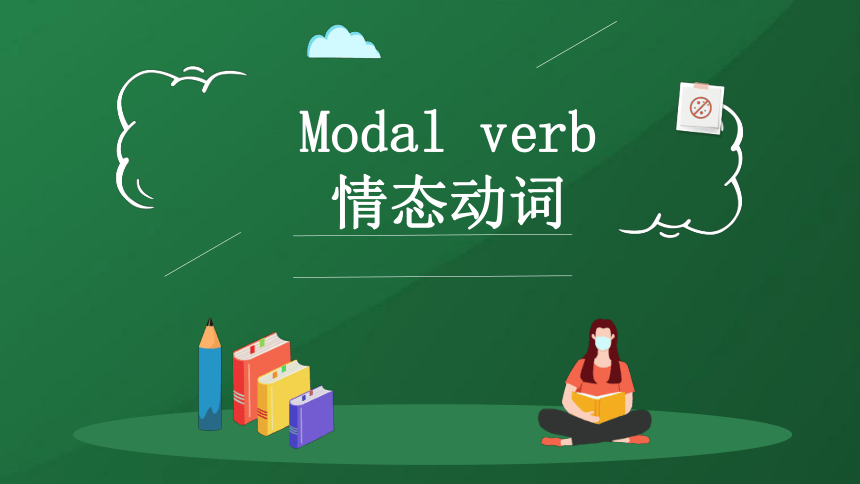
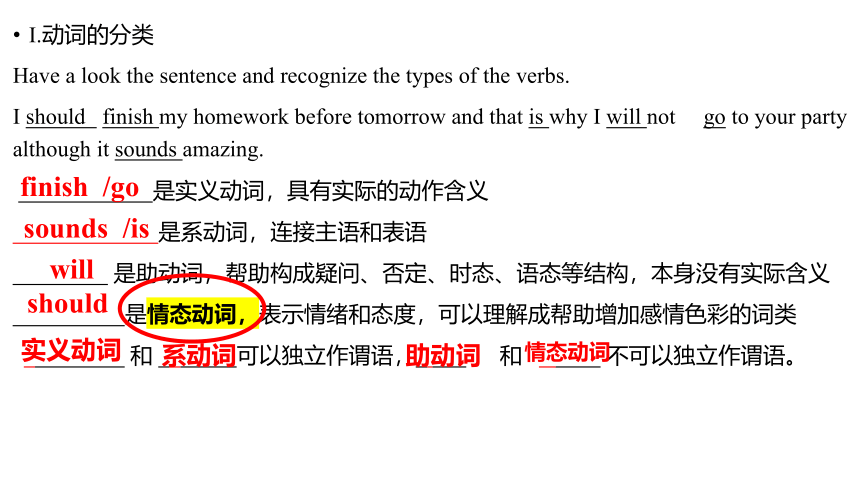
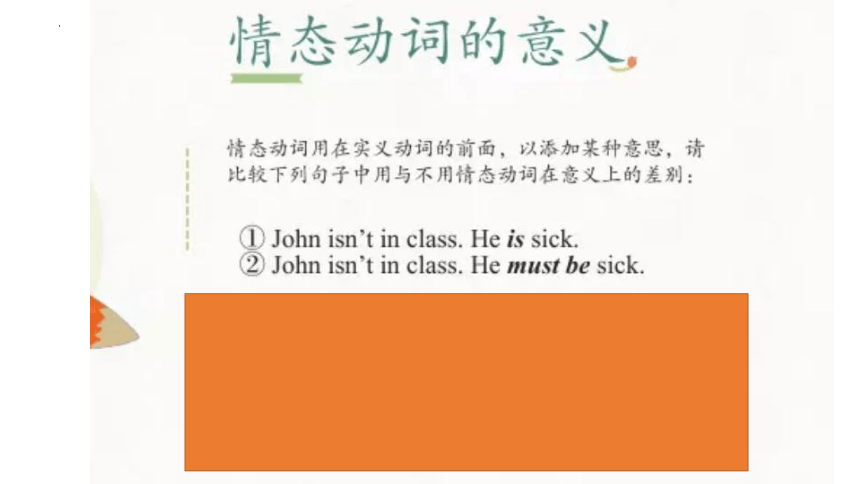
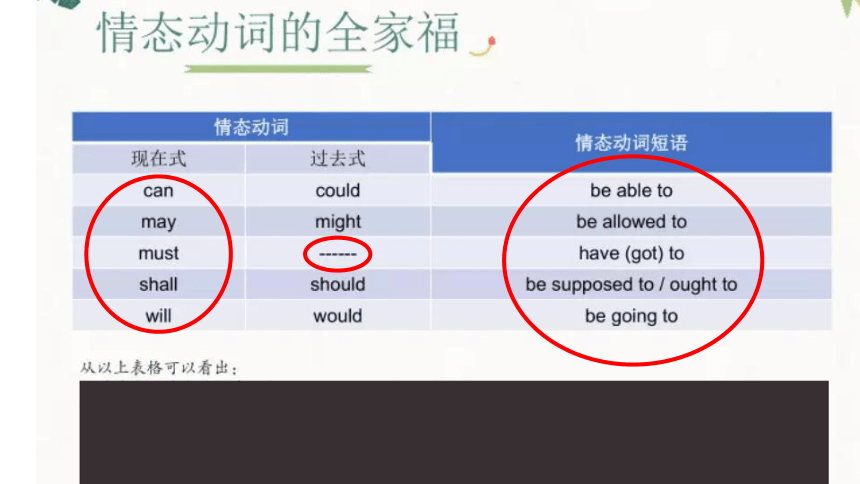
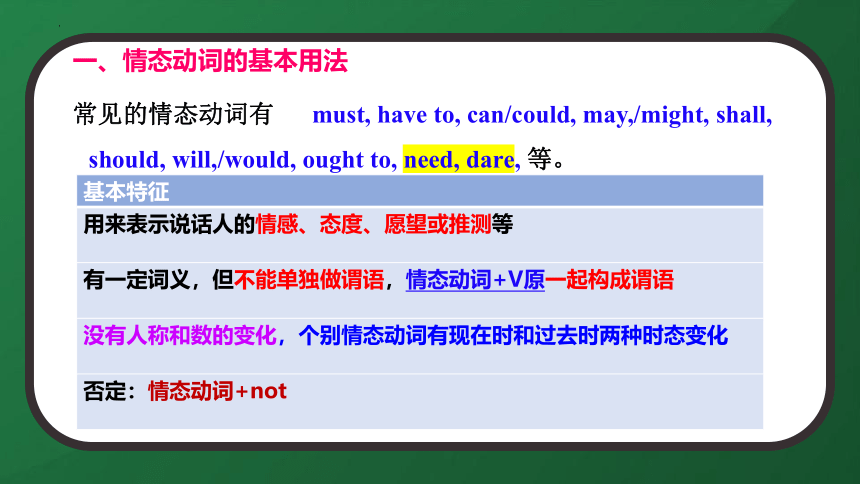



文档简介
(共22张PPT)
Modal verb
情态动词
I.动词的分类
Have a look the sentence and recognize the types of the verbs.
I should finish my homework before tomorrow and that is why I will not go to your party although it sounds amazing.
是实义动词,具有实际的动作含义
是系动词,连接主语和表语
是助动词,帮助构成疑问、否定、时态、语态等结构,本身没有实际含义
是情态动词,表示情绪和态度,可以理解成帮助增加感彩的词类
和 可以独立作谓语, 和 不可以独立作谓语。
finish /go
sounds /is
will
should
实义动词
系动词
助动词
情态动词
基本特征
用来表示说话人的情感、态度、愿望或推测等
有一定词义,但不能单独做谓语,情态动词+V原一起构成谓语
没有人称和数的变化,个别情态动词有现在时和过去时两种时态变化
否定:情态动词+not
一、情态动词的基本用法
常见的情态动词有 must, have to, can/could, may,/might, shall, should, will,/would, ought to, need, dare, 等。
1 Mary can speak 3 languages.2 That can’t be true.3 Tom could sing English songs at the age of 6.4 Accident can happen in this weather.5 Can/Could you help me 句子 和 .表示体力或脑力(知识、技能)所产生的能力。
句子 和 表示可能性(常用于否定、疑问句),在疑问句中表示困惑、不相信等语气句子 表示请求;允许(回答时用can)
(一)can/could
1
3
2
4
5
用法 can could
1.表示体力或脑力(知识、技能)所产生的能力。 现在的能力 Mary can speak 3 languages. 过去的能力
Tom could sing English songs at the age of 6.
2.可能性(常用于否定、疑问句),在疑问句中表示困惑、不相信等语气。 That can’t be true. 在肯定句中表示客观的可能性(理论上可能),用来说明人或事物的特征. Accident can happen in this weather. 过去的推测
推测的语气比can 弱
It could be weeks before we get a reply.
3.请求;允许(回答时用can) ---Can/Could you help me ---Yes, I can. 比can更委婉
1 May I come in
2 The news may/might be true.
3 May you be happy!
句 1 表示请求或允许。(用 might 比用 may 更礼貌,语气更委婉)
句 2 表示推测,表示“或许,大概”。用于肯定句或否定句中,用might 比 may语气更加不肯定。
句 3 中may 用于祈使句,表祝愿,并且 may 通常放在句首。
二、may/might
用法 例句
1.表示请求或允许。(用 might 比用 may 更礼貌,语气更委婉) —May I come in
You may leave the book where it was.
2.表示推测,表示“或许,大概”。用于肯定句或否定句中,用might 比 may语气更加不肯定。 The news may/might be true.
He might not come today.
3.may 用于祈使句,表祝愿,并且 may 通常放在句首。 May you be happy!
May you succeed!
(3)must
1 All students must obey the school rules.
2 You mustn't smoke here.
3 You must be tired after the long journey.
句 1 表示强制、义务、必要性,意为“必须”(主观意志)
句 2 否定形式must not (mustn't),表示“禁止”“不准”。
句 3 表示推测。(只能用在肯定句中,表示“一定,准是”,在否定句或疑问句中要用 can 或 could)
三、must
区分:must 和have to
All students must obey the school rules.
I have to hand in my term paper before 5:00 today.
must表示出于 意识而必须要做某事;
have to表示由于某种 原因而不得不做某事。除此以外,have to自身有时态的变化形式。
主观
客观
用法 例句
1.表示强制、义务、必要性,意为“必须”(主观意志) All students must obey the school rules.
—Must we hand in our exercises today
—Yes, you must.
—No, you needn't(you don't have to).
2.否定形式must not (mustn't),表示“禁止”“不准”。
You mustn't smoke here.
3. 表示推测。(只能用在肯定句中,表示“一定,准是”,在否定句或疑问句中要用 can 或 could)
You must be tired after the long journey.
Shall I open the window for you?
Young people should learn how to use computers.
四、shall/should/ought to/had better
用法 注意
shall 请求、征求意见 第一、三人称,疑问句
should 应该=ought to=had better 应该(劝告、建议、义务上)
五、will/would
1 I will never do that again.
2 Will/Would you like a cup of coffee
句 1 表示意志、意愿或决心。用于各种人称,will 指现在,would 指过去。
句 2 表示请求、建议。用于第二人称的疑问句,would 表示更委婉的语气。
1 You need /dare to buy a bicycle.2 You needn’t/daren't buy a bicycle.3 You don’t need to /dare to buy a bicycle.句 的need和dare是情态动词,无人称和数的变化,肯定形式是 ,否定形式是 句 的need和dare是实义动词,有人称和数的变化,肯定形式是 ,否定形式是________________________________________________________________
六、need/dare
2
主+need /dare do
主+needn't/daren't do(=don't have to do).
1,3
need to do
主+do/does/did not need to/dare (to) do.
must
can/could
may/might
shall
should
will
would
need
dare
1.必须(主观意志)
2.一定(推测)
1.能
2.可能(推测)
1.可以
2.可能(推测)
3.祝愿
征求意见
应该
1.意愿
2.征求意见
1.意愿
2.征求意见
需要
敢
情态动词用法总结
1 Although this ________ sound like a simple task, great care is needed.
A. must B. may
C. shall D. should
2 You ________ be hungry already—you had lunch only two hours ago!
A. wouldn’t B. can’t
C. mustn’t D. needn’t
3 You____ to town to see the film yesterday. It will be on TV tonight.
A. needn't go B. had better not go
C. should not go D. mustn't go
4 Thank you for all your hard work last week. I don’t think we ________ it without you.
A. shall manage B. should manage
C. could manage D. dare manage
Underline the modals in the introduction to an app and talk about their meanings.
dare to: be afraid to do something
needn’t: not be necessary to do something
have to: be necessary to do something
be able to: have the ability to do something
aren’t able to: don't have the ability to do something
had better :give advice to do something
P6 2
Complete the tips for good table manners with the correct form of modals in Activity 1.
have to
dare not
had better
needn't
be able to
P5 3
Modal verb
情态动词
I.动词的分类
Have a look the sentence and recognize the types of the verbs.
I should finish my homework before tomorrow and that is why I will not go to your party although it sounds amazing.
是实义动词,具有实际的动作含义
是系动词,连接主语和表语
是助动词,帮助构成疑问、否定、时态、语态等结构,本身没有实际含义
是情态动词,表示情绪和态度,可以理解成帮助增加感彩的词类
和 可以独立作谓语, 和 不可以独立作谓语。
finish /go
sounds /is
will
should
实义动词
系动词
助动词
情态动词
基本特征
用来表示说话人的情感、态度、愿望或推测等
有一定词义,但不能单独做谓语,情态动词+V原一起构成谓语
没有人称和数的变化,个别情态动词有现在时和过去时两种时态变化
否定:情态动词+not
一、情态动词的基本用法
常见的情态动词有 must, have to, can/could, may,/might, shall, should, will,/would, ought to, need, dare, 等。
1 Mary can speak 3 languages.2 That can’t be true.3 Tom could sing English songs at the age of 6.4 Accident can happen in this weather.5 Can/Could you help me 句子 和 .表示体力或脑力(知识、技能)所产生的能力。
句子 和 表示可能性(常用于否定、疑问句),在疑问句中表示困惑、不相信等语气句子 表示请求;允许(回答时用can)
(一)can/could
1
3
2
4
5
用法 can could
1.表示体力或脑力(知识、技能)所产生的能力。 现在的能力 Mary can speak 3 languages. 过去的能力
Tom could sing English songs at the age of 6.
2.可能性(常用于否定、疑问句),在疑问句中表示困惑、不相信等语气。 That can’t be true. 在肯定句中表示客观的可能性(理论上可能),用来说明人或事物的特征. Accident can happen in this weather. 过去的推测
推测的语气比can 弱
It could be weeks before we get a reply.
3.请求;允许(回答时用can) ---Can/Could you help me ---Yes, I can. 比can更委婉
1 May I come in
2 The news may/might be true.
3 May you be happy!
句 1 表示请求或允许。(用 might 比用 may 更礼貌,语气更委婉)
句 2 表示推测,表示“或许,大概”。用于肯定句或否定句中,用might 比 may语气更加不肯定。
句 3 中may 用于祈使句,表祝愿,并且 may 通常放在句首。
二、may/might
用法 例句
1.表示请求或允许。(用 might 比用 may 更礼貌,语气更委婉) —May I come in
You may leave the book where it was.
2.表示推测,表示“或许,大概”。用于肯定句或否定句中,用might 比 may语气更加不肯定。 The news may/might be true.
He might not come today.
3.may 用于祈使句,表祝愿,并且 may 通常放在句首。 May you be happy!
May you succeed!
(3)must
1 All students must obey the school rules.
2 You mustn't smoke here.
3 You must be tired after the long journey.
句 1 表示强制、义务、必要性,意为“必须”(主观意志)
句 2 否定形式must not (mustn't),表示“禁止”“不准”。
句 3 表示推测。(只能用在肯定句中,表示“一定,准是”,在否定句或疑问句中要用 can 或 could)
三、must
区分:must 和have to
All students must obey the school rules.
I have to hand in my term paper before 5:00 today.
must表示出于 意识而必须要做某事;
have to表示由于某种 原因而不得不做某事。除此以外,have to自身有时态的变化形式。
主观
客观
用法 例句
1.表示强制、义务、必要性,意为“必须”(主观意志) All students must obey the school rules.
—Must we hand in our exercises today
—Yes, you must.
—No, you needn't(you don't have to).
2.否定形式must not (mustn't),表示“禁止”“不准”。
You mustn't smoke here.
3. 表示推测。(只能用在肯定句中,表示“一定,准是”,在否定句或疑问句中要用 can 或 could)
You must be tired after the long journey.
Shall I open the window for you?
Young people should learn how to use computers.
四、shall/should/ought to/had better
用法 注意
shall 请求、征求意见 第一、三人称,疑问句
should 应该=ought to=had better 应该(劝告、建议、义务上)
五、will/would
1 I will never do that again.
2 Will/Would you like a cup of coffee
句 1 表示意志、意愿或决心。用于各种人称,will 指现在,would 指过去。
句 2 表示请求、建议。用于第二人称的疑问句,would 表示更委婉的语气。
1 You need /dare to buy a bicycle.2 You needn’t/daren't buy a bicycle.3 You don’t need to /dare to buy a bicycle.句 的need和dare是情态动词,无人称和数的变化,肯定形式是 ,否定形式是 句 的need和dare是实义动词,有人称和数的变化,肯定形式是 ,否定形式是________________________________________________________________
六、need/dare
2
主+need /dare do
主+needn't/daren't do(=don't have to do).
1,3
need to do
主+do/does/did not need to/dare (to) do.
must
can/could
may/might
shall
should
will
would
need
dare
1.必须(主观意志)
2.一定(推测)
1.能
2.可能(推测)
1.可以
2.可能(推测)
3.祝愿
征求意见
应该
1.意愿
2.征求意见
1.意愿
2.征求意见
需要
敢
情态动词用法总结
1 Although this ________ sound like a simple task, great care is needed.
A. must B. may
C. shall D. should
2 You ________ be hungry already—you had lunch only two hours ago!
A. wouldn’t B. can’t
C. mustn’t D. needn’t
3 You____ to town to see the film yesterday. It will be on TV tonight.
A. needn't go B. had better not go
C. should not go D. mustn't go
4 Thank you for all your hard work last week. I don’t think we ________ it without you.
A. shall manage B. should manage
C. could manage D. dare manage
Underline the modals in the introduction to an app and talk about their meanings.
dare to: be afraid to do something
needn’t: not be necessary to do something
have to: be necessary to do something
be able to: have the ability to do something
aren’t able to: don't have the ability to do something
had better :give advice to do something
P6 2
Complete the tips for good table manners with the correct form of modals in Activity 1.
have to
dare not
had better
needn't
be able to
P5 3
